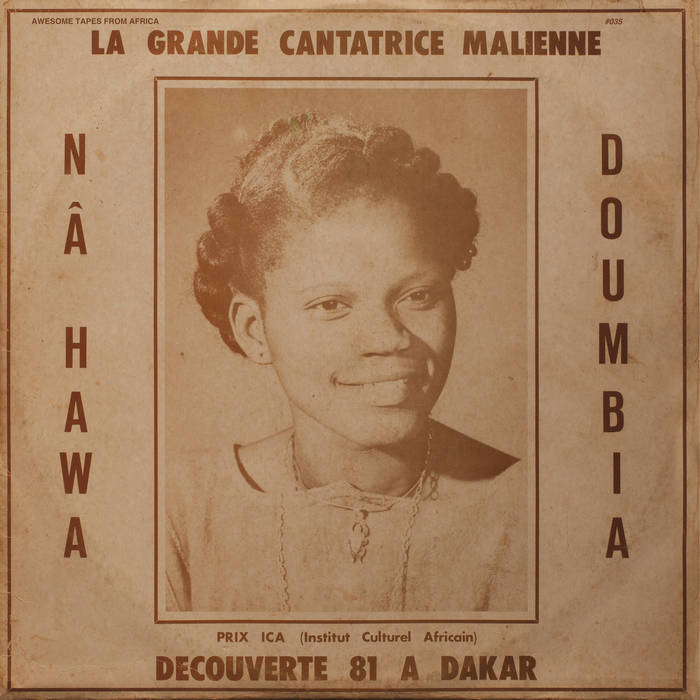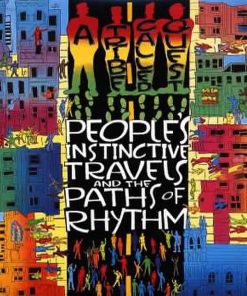Nahawa Doumbia – La Grande Cantatrice Malienne, Vol. 1 LP Awesome Tapes from Africa
$ 19,98 Original price was: $ 19,98.$ 11,99Current price is: $ 11,99.
Nahawa Doumbia is one of Mali’s defining vocalists of the last four decades. Her work journeys through progressive stages of musical evolution and sonic vogues, making it hard to summarize or even comprehend. She’s played a part in popular music since the late ’70s, as her version of Wassoulou music developed from vocals-and-guitar duo into full-scale touring bands packing a bombastic, electrified punch. As Doumbia puts it, “My music has changed multiple times to this day… The more I progressed in my musical career, the more instruments I have had accompany my songs.” Awesome Tapes From Africa will release Doumbia’s debut recording La Grande Cantatrice Malienne Vol 1 this August, building on the success of the label’s first-ever reissue back in 2011, Doumbia’s La Grande Cantatrice Malienne Vol 3. This seminal classic, which is still sought-after in Mali today, will finally be available for the first time internationally with remastered audio on LP, CD, Tape and Digital formats. The recording looks back to the beginning of Doumbia’s long career, when she was performing in a simple voice and acoustic guitar format. This was before she added bass and drums, and finally the electric guitar and synths for which she became known more recently. Released in 1981 by the excellent Côte d’Ivoire-based AS Records, the singer was barely 20 years old when it was recorded. She was accompanied by her future husband N’Gou Bagayoko on acoustic guitar, whose style echoes the nimble runs of traditional kamele n’goni players. The stark simplicity of this highly intimate recording- the audible room acoustics, the occasionally in-the-red vocals-do not obscure the mature strength of her voice. On Vol 1 Doumbia performs her songs with the tenacity and hunger of a young artist on the cusp. “When I think about it, first, I am reminded of how long ago it was. It’s one of the albums that I love most because it reminds me of my youth. I was so young and my voice was light and joyful. I still listen to some of those songs today. I am really proud of that first album because that’s where it all began. It shows me how far I’ve come in my personal and artistic life; it gives me the courage I need to keep going forward, and makes me appreciate all the years of dedication and hard work I put into my musical career.” These early songs are rhythmically built around Bagayoko’s sensitive guitar, as his fingers brush the fretboard and gently outline the melodies. Although this record predates the singer’s use of percussion, the driving skeletal didadi rhythm is apparent in the songs. Later albums like Vol 3 further prioritize her hometown didadi beat and the result made her famous.
La Grande Cantatrice Malienne Vol 1 by Nahawa Doumbia
Fast Shipping and Professional Packing
We offer a broad range of shipping options due to our long-running partnerships with UPS, FedEx and DHL. Our warehouse employees will pack all goods to our exacting requirements. Your items are carefully inspected and secured properly prior to shipping. We ship to thousands of customers every day from all over the world. This demonstrates our dedication to becoming the largest online retailer in the world. Warehouses and distribution centres can be located in Europe as well as the USA.
Note: Orders that contain more than one item will be assigned a processing date depending on the item.
We will carefully examine all items before sending. Today, the majority of orders will be shipped within 48 hours. The expected delivery time will be between 3 and 7 days.
Returns
Stock is dynamic. It's not completely managed by us, since we have multiple entities, including the factory and the storage. The actual inventory can fluctuate at any time. It is possible that the stocks could be depleted after your order has been processed.
Our policy lasts 30 days. If you haven't received the product within 30 days, we're not able to issue a refund or an exchange.
To be eligible for a refund the product must be unopened and in the same state as when you received it. The item must be returned in its original packaging.
Related products
Vinyl
Acid Mothers Temple & Melting Paraiso U.F.O. – Hallelujah Mystic Garden Part 2 LP Important Records
Vinyl
Vinyl
Vinyl
Acid Mothers Temple & Melting Paraiso U.F.O. – Hallelujah Mystic Garden Part 1 LP Important Records



































